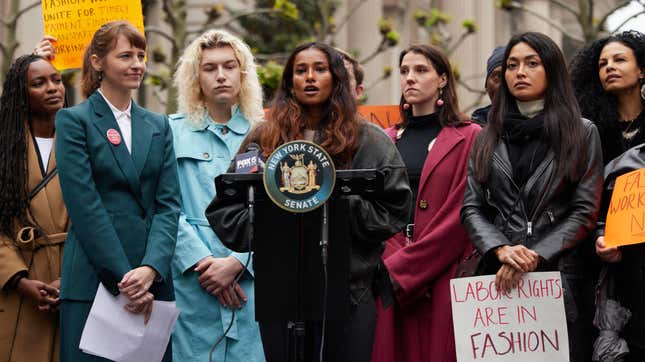
The fashion industry has long been regarded as a predatory environment for young people, but the latest revelations paint an even more disturbing picture of the horrors some models endured in the last decade.
An explosive new report in Variety Tuesday features the stories of more than a dozen models and other related workers who say the modeling agencies who represented them helped ceate a culture ripe for financial and sexual exploitation. It’s common knowledge that models have always been held to unattainable body standards, but some of the details these people provided are far worse than previously imagined.
Esmeralda Seay-Reynolds, Variety reports, was 15 years old when she was scouted by the New York agency Click Model Management. She was 5-foot-11 and 130 pounds, but was told she looked “too mature,” otherwise known as “too heavy” in the fashion industry, because she’d developed curves like any other teenager. After dropping 20 pounds, Seay-Reynolds was signed by NEXT, a household agency that currently manages talent including Alexa Chung, Billie Eilish, and Lana Del Rey.
When Seay-Reynolds was 16, she shot with a photographer who had been publicly accused of sexual coercion. She says she once received $130 for a total of six weeks of work, and was later forced to climb a glacier in high heels before getting naked in freezing weather—a gig she says she was never paid for. And despite already losing weight, Seay-Reynolds was encouraged to stave off her hunger by chewing cotton balls. “I remember my agent saying, ‘Cotton balls are organic, so it’s fine if you just swallow them to make yourself feel full.’”
In response to a request for comment, NEXT co-founder Joel Wilkenfeld told Variety: “When we send models to photo shoots, we vet the people, and we hope that that model would call us if they were exposed to conditions such as this. The unfortunate part is we’re not on every shoot.” Regarding the cotton balls, Wilkenfeld said, “If a model would have brought that to our attention, that agent would have been fired right there on the spot.” The photographer responsible for the hazardous glacial photoshoot commented: “At the end of our shoot it was made known to me that she was refusing to eat anything. We immediately called her agency NEXT Models to express our concern she might be dealing with…an eating disorder…I was upset that her agency would have sent a model who had such concerns on any shoot, not to mention a destination project.”
Sara Ziff, the founder of the Model Alliance, said that the abuse, however, went far beyond predatory photographers and eating disorders. Along with the downturn of the global economy, Ziff notes that some modeling agencies have gone so far as to recruit skinny young people from war zones. Seay-Reynolds, who at her thinnest was around 80 pounds, said that agencies will also scout for talent at anorexia and bulimia clinics.
“Models are now being scouted from refugee camps by agencies in this new era of trying to promote diversity,” Ziff said. “They’re actually preying on girls in refugee camps, and then allowing them to come live in the model apartment, rack up debt and then return them to the refugee camp.”
Kaja Sokola, one of the women who came forward with accusations against Harvey Weinstein during the #Me Too movement, says that the culture of the industry still provides men like Weinstein special access and proximity to the young models, many of whom are still teenagers launched into New York City with essentially no adult supervision. In September 2002, a 16-year-old Sokola had just arrived from Poland when she attended an event hosted by her modeling agency, NEXT. She met Weinstein there, and three days later, Sokola says the producer sexually assaulted her. “Modeling agencies are sometimes like pimps for rich people,” she says.
“The modeling industry really does in some cases rise to the level of trafficking—labor trafficking and sex trafficking,” says Ziff, who helps educate models about their rights within the industry and is currently fighting to improve their workplaces. “This lack of transparency, the power imbalance, the vulnerability of these mostly young, immigrant women, it’s a recipe for exploitation. In the early stages of doing this work, I refrained from using the language of trafficking because it felt too extreme. But that’s what it is.”
Ziff and other members of the Model Alliance helped craft legislation titled the Fashion Workers Act, which was designed to hold modeling agencies accountable for model abuse they’ve caused or enabled. On June 8, the New York Senate passed the law, bringing models one step closer to basic rights such as requiring agencies to provide workers copies of their contracts and enacting a zero-tolerance policy for abuse.
The Assembly is expected to return later this month for a final vote on the act—and let’s hope it actually does something.